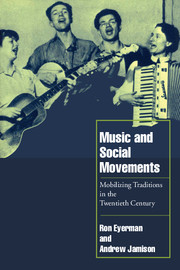Book contents
- Frontmatter
- Contents
- Acknowledgments
- Introduction
- 1 On social movements and culture
- 2 Taking traditions seriously
- 3 Making an alternative popular culture: from populism to the popular front
- 4 The movements of black music: from the New Negro to civil rights
- 5 Politics and music in the 1960s
- 6 From the sixties to the nineties: the case of Sweden
- 7 Structures of feeling and cognitive praxis
- Notes
- Bibliography
- Index
4 - The movements of black music: from the New Negro to civil rights
Published online by Cambridge University Press: 26 October 2011
- Frontmatter
- Contents
- Acknowledgments
- Introduction
- 1 On social movements and culture
- 2 Taking traditions seriously
- 3 Making an alternative popular culture: from populism to the popular front
- 4 The movements of black music: from the New Negro to civil rights
- 5 Politics and music in the 1960s
- 6 From the sixties to the nineties: the case of Sweden
- 7 Structures of feeling and cognitive praxis
- Notes
- Bibliography
- Index
Summary
I, too, sing America.
I am the darker brother.
They send me to eat in the kitchen
When company comes,
But I laugh,
And eat well,
And grow strong.
Tomorrow,
I'll sit at the table
When company comes.
Nobody'll dare
Say to me,
“Eat in the kitchen,”
Then.
Besides,
They'll see how beautiful I am
And be ashamed –
I, too, am America.
Langston HughesFrom the beginning of the century, when W. E. B. DuBois analyzed the “souls of black folk” in his extremely influential book of 1903, African-American social movements have been closely identified with particular forms of musical expression. There had been other books which collected and represented the songs of African-Americans, such as the abolitionist era's Slave Songs of the United States (1867) and James Monroe Trotter's Music and Some Highly Musical People (1878), but DuBois's book put these songs in a social and historical context, and tried to give them clear political meaning. DuBois saw in what he termed the “sorrow songs” a central signifier of black culture, and he saw the spirituals as a central aspect of his own identity as a black man in the United States. As he wrote, “They that walked in darkness sang songs in the olden days – Sorrow Songs – for they were weary at heart … Ever since I was a child these songs have stirred me strangely.
- Type
- Chapter
- Information
- Music and Social MovementsMobilizing Traditions in the Twentieth Century, pp. 74 - 105Publisher: Cambridge University PressPrint publication year: 1998

